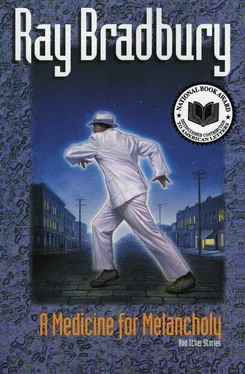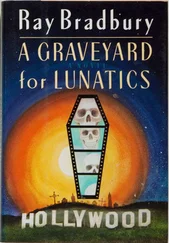“Nonsense!” Mr. Bittering looked out the windows. “We’re clean, decent people.” He looked at his children. “All dead cities have some kind of ghosts in them. Memories, I mean.” He stared at the hills. “You see a staircase and you wonder what Martians looked like climbing it. You see Martian paintings and you wonder what the painter was like. You make a little ghost in your mind, a memory. It’s quite natural. Imagination.” He stopped. “You haven’t been prowling up in those ruins, have you?”
“No, Papa.” David looked at his shoes.
“See that you stay away from them. Pass the jam.”
“Just the same,” said little David, “I bet something happens.”
Something happened that afternoon.
Laura stumbled through the settlement, crying. She dashed blindly onto the porch.
“Mother, Father—the war, Earth!” she sobbed. “A radio flash just came. Atom bombs hit New York! All the space rockets blown up. No more rockets to Mars, ever!”
“Oh, Harry!” The mother held onto her husband and daughter.
“Are you sure, Laura?” asked the father quietly.
Laura wept. “We’re stranded on Mars, forever and ever!”
For a long time there was only the sound of the wind in the late afternoon.
Alone, thought Bittering. Only a thousand of us here. No way back. No way. No way. Sweat poured from his face and his hands and his body; he was drenched in the hotness of his fear. He wanted to strike Laura, cry, “No, you’re lying! The rockets will come back!” Instead, he stroked Laura’s head against him and said, “The rockets will get through someday.”
“Father, what will we do?”
“Go about our business, of course. Raise crops and children. Wait. Keep things going until the war ends and the rockets come again.”
The two boys stepped out onto the porch.
“Children,” he said, sitting there, looking beyond them, “I’ve something to tell you.”
“We know,” they said.
In the following days, Bittering wandered often through the garden to stand alone in his fear. As long as the rockets had spun a silver web across space, he had been able to accept Mars. For he had always told himself: Tomorrow, if I want, I can buy a ticket and go back to Earth.
But now: The web gone, the rockets lying in jigsaw heaps of molten girder and unsnaked wire. Earth people left to the strangeness of Mars, the cinnamon dusts and wine airs, to be baked like gingerbread shapes in Martian summers, put into harvested storage by Martian winters. What would happen to him, the others? This was the moment Mars had waited for. Now it would eat them.
He got down on his knees in the flower bed, a spade in his nervous hands. Work, he thought, work and forget.
He glanced up from the garden to the Martian mountains. He thought of the proud old Martian names that had once been on those peaks. Earthmen, dropping from the sky, had gazed upon hills, rivers, Martian seats left nameless in spite of names. Once Martians had built cities, named cities; climbed mountains, named mountains; sailed seas, named seas. Mountains melted, seas drained, cities tumbled. In spite of this, the Earthmen had felt a silent guilt at putting new names to these ancient hills and valleys.
Nevertheless, man lives by symbol and label. The names were given.
Mr. Bittering felt very alone in his garden under the Martian sun, anachronism bent here, planting Earth flowers in a wild soil.
Think. Keep thinking. Different things. Keep your mind free of Earth, the atom war, the lost rockets.
He perspired. He glanced about. No one watching. He removed his tie. Pretty bold, he thought. First your coat off, now your tie. He hung it neatly on a peach tree he had imported as a sapling from Massachusetts.
He returned to his philosophy of names and mountains. The Earthmen had changed names. Now there were Hormel Valleys, Roosevelt Seas, Ford Hills, Vanderbilt Plateaus, Rockefeller Rivers, on Mars. It wasn’t right. The American settlers had shown wisdom, using old Indian prairie names: Wisconsin, Minnesota, Idaho, Ohio, Utah, Milwaukee, Waukegan, Osseo. The old names, the old meanings.
Staring at the mountains wildly, he thought: Are you up there? All the dead ones, you Martians? Well, here we are, alone, cut off! Come down, move us out! We’re helpless!
The wind blew a shower of peach blossoms.
He put out his sun-browned hand and gave a small cry. He touched the blossoms and picked them up. He turned them, he touched them again and again. Then he shouted for his wife.
“Cora!”
She appeared at a window. He ran to her.
“Cora, these blossoms!”
She handled them.
“Do you see? They’re different. They’ve changed! They’re not peach blossoms any more!”
“Look all right to me,” she said.
“They’re not. They’re wrong! I can’t tell how. An extra petal, a leaf, something, the color, the smell!”
The children ran out in time to see their father hurrying about the garden, pulling up radishes, onions, and carrots from their beds.
“Cora, come look!”
They handled the onions, the radishes, the carrots among them.
“Do they look like carrots?”
“Yes … no.” She hesitated. “I don’t know.”
“They’re changed.”
“Perhaps.”
“You know they have! Onions but not onions, carrots but not carrots. Taste: the same but different. Smell: not like it used to be.” He felt his heart pounding, and he was afraid. He dug his fingers into the earth. “Cora, what’s happening? What is it? We’ve got to get away from this.” He ran across the garden. Each tree felt his touch. “The roses. The roses. They’re turning green!”
And they stood looking at the green roses.
And two days later Dan came running. “Come see the cow. I was milking her and I saw it. Come on!”
They stood in the shed and looked at their one cow.
It was growing a third horn.
And the lawn in front of their house very quietly and slowly was coloring itself like spring violets. Seed from Earth but growing up a soft purple.
“We must get away,” said Bittering. “We’ll eat this stuff and then we’ll change—who knows to what? I can’t let it happen. There’s only one thing to do. Burn this food!”
“It’s not poisoned.”
“But it is. Subtly, very subtly. A little bit. A very little bit. We mustn’t touch it.”
He looked with dismay at their house. “Even the house. The wind’s done something to it. The air’s burned it. The fog at night. The boards, all warped out of shape. It’s not an Earthman’s house any more.”
“Oh, your imagination!”
He put on his coat and tie. “I’m going into town. We’ve got to do something now. I’ll be back.”
“Wait, Harry!” his wife cried.
But he was gone.
In town, on the shadowy step of the grocery store, the men sat with their hands on their knees, conversing with great leisure and ease.
Mr. Bittering wanted to fire a pistol in the air.
What are you doing, you fools! he thought. Sitting here! You’ve heard the news—we’re stranded on this planet. Well, move! Aren’t you frightened? Aren’t you afraid? What are you going to do?
“Hello, Harry,” said everyone.
“Look,” he said to them. “You did hear the news, the other day, didn’t you?”
They nodded and laughed. “Sure. Sure, Harry.”
“What are you going to do about it?”
“Do, Harry, do? What can we do?”
“Build a rocket, that’s what!”
“A rocket, Harry? To go back to all that trouble? Oh, Harry!”
“But you must want to go back. Have you noticed the peach blossoms, the onions, the grass?”
“Why, yes, Harry, seems we did,” said one of the men.
Читать дальше












